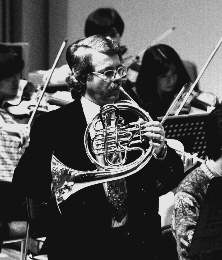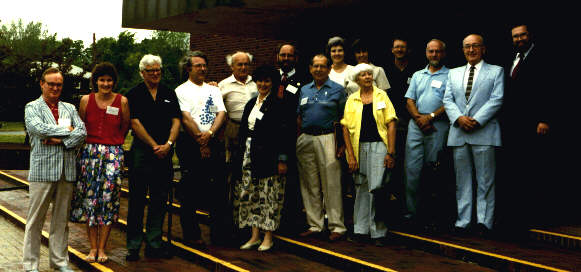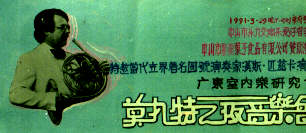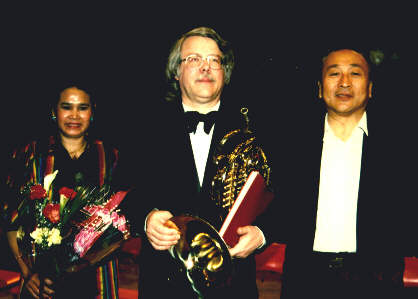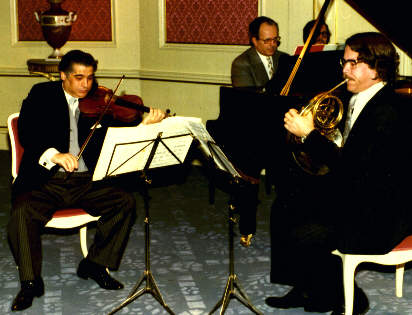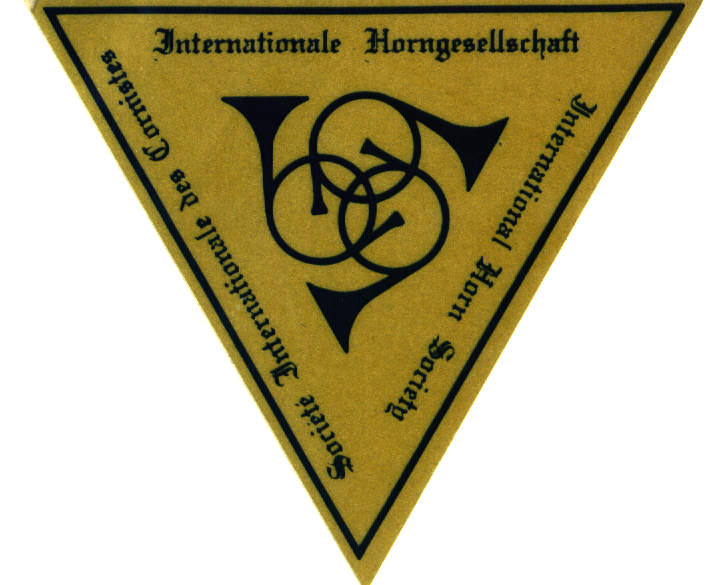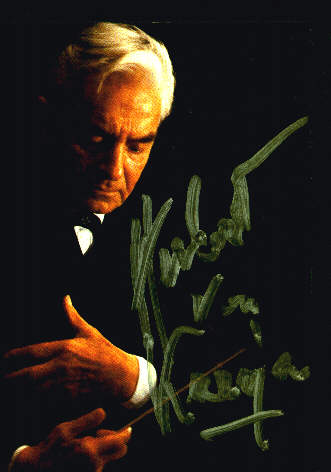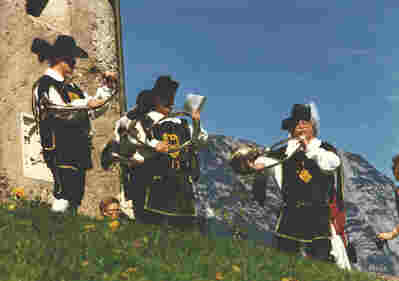|
Prof.Hans Pizka, biographical notes |
|
 actual instruments on pictures are private property of Hans Pizka. Prof.Hans Pizka playing his own convertible Ganter Viennese Horn, the valve section detached, to convert the instrument into a natural horn of the Uhlmann style of Vienna 1820, here playing Giovanni Puntos Concerto no.3 at Zehusice 1994, Punto birth place Prof. Hans Pizka, born 1942 in Metz/Lorraine/France (the national anthem of France ) as first son to the late horn professor Erich Pizka. Even grown up in Austria, his family roots go deep into Bavarias Suebia province near Fuessen & Memmingen, which was part of Austria then, back to the 15th century and further on to the 7th century, back to the 16th century in Upper Austrias Muehlviertel (Lasberg, Freistadt & Neumarkt i.M.), to 1650 in Manetin north to Pilsen and from mothers side back to the early 12th century in St.Hubert near Kerpen not far from Cologne & Sevelen & Kalkar next to Cleve & Xanten. Interesting might be, that grandfathers ancestors from mothers family came from near Xanten, the site of Siegfried, while there was a Maria Stich within fathers ancestors in Upper Austria, coming from central Bohemia in the early 18th century, the same century Johann Wenzel Stich (Giovanni Punto) was born. He was educated at the Academic Gymnasium in Linz/Upper Austria (over 450 years old school) mainly by professors of Jesuit tradition (streight forward, but conservative, but also most liberal). Hans Pizka, a citizen of Austria is multilingual & speaks German, English & Italian & understands & speaks some other languages well enough to communicate, can read Greek & Thai (slowly). He also can read the old style Suetterlin German writings & the ancient "French" court writings of the 16th & 17th century. He began his musical education at age 4 with violin, continued with viola & horn at age 9, studying with his father first and continued with the late Gottfried von Freiberg & Josef Veleba in Vienna (Vienna Philharmonic). H.P. received his first review about his horn playing at age eleven. He played his first horn concerto with professional orchestra accompaniment when 15 years old. He is married to Boorlian Pizka, maiden name Nuangmathcha, since 1971. Mrs.Pizka comes from Thailand. His orchestral career led him from Linz (Bruckner Orchestra), to Duesseldorf as sucessor to famous Gerd Seifert and Munich as successor to Norbert Hauptmann. He is holding "the Franz Strauss Chair" as the Bavarian State Orchestra´s principal horn in the Bavarian State Opera in Munich since 1967, often being called as an extra player or filling the first horn position at the Vienna Philharmonic. Besides his duties in the orchestra under the batons of the most famous conductors (Herbert v.Karajan, Karl Boehm, Carlos Kleiber, Wolfgang Sawallisch, Zubin Mehta, Seiji Ozawa, Riccardo Muti, Claudio Abbado, Rafael Kubelik, Leonard Bernstein a.s.o.), he is a frequent soloist in many countries (Germany, Japan, Czech Republic, Bulgaria, Thailand, China, Italy, Spain, Brasil, Argentina, Uruguay, Colombia, Chile, Egypt, Singapore, Romania, Lithuania, etc.), writer of several books ("Mozart & the Horn", "Hornist Dictionary 1986", "Wagner & the Horn" - to come on CD-ROM ), lecturer, horn designer, horn collector, publisher of horn related music, producer of Compact Discs, expert regarding nearly everything connected with the horn. video clip from Symphonia domestica 1980 Wolfgang Sawallisch conducting (Horn players are from left: Hans Pizka assistant & high e3, Klaus Wallendorf, Manfred Neukirchner, Karl Heinz Fedder, Sebastian Huber....) the high e3 is mine as on the following sound clip from Wolfgang Sawallisch´s official last concert as our GMD - 1993 - watch for the final chord where I hit the high e3 at ffffffffffff - I did it in the dress rehearsal just for fun, but in the evening, Sawallisch feared that I could ruin the whole concert by hitting & breaking the high e3, so he became quite pale the nearer we came to the end, but I did it in both concert & did it again for two concerts with Zubin Mehta a few years ago. The high e3 is really a very strong note due to the high amplitude. - Videoclip von der Symph.domestica 1980, Sawallisch dirigiert. Die hohen e3 sind von mir wie auch jene auf dem anschliessenden Audioclip von Sawallisch´s letztem Konzert als unser Chef 1993. Hört auf das hohe e3 im Schlussakkord im "ffff". Ich hab das in der Generalprobe probiert, nur so zum Spass. Am Abend jedoch hatte W.S. doch Angst, ich könnte das Konzert durch ein verkieckstes hohes e3 ruinieren, und wirde immer blässer, je näher wir dem Ende kamen. Aber ich hab´ es in beiden Konzerten gemacht und später bei Mehte genauso. Das hohe e3 ist wirklich ein guter Ton und im fortissimo mit der höchsten Durschlagskraft.(ohne hoch F, versteht sich !) DomestFragm.WMA = 1993 video clip from Brahms No.1 Symphony, Hiroshi Wakasugi conducting, Volker Hardt plays 2nd horn. video clip from Anton Bruckners No.2 Symphony, Wolfgang Sawallisch conducting, Manfred Neukirchner plays 2nd horn. Hans Pizka was Vicepresident of the IHS, served in the advisory council for six terms (after the completion of the last term he has served the Advisory Council for 18 years). He translated & published the Horncall in the German language (Hornruf) between 1983 & 1994. His life long devotion to his art & his activities as ambassador through music have been honored by the President of the Federal Republic of Austria with the honorary title of a professor. The IHS honoured his efforts on behalf of the International Horn Society by bestowing Hans Pizka with the most honourable title of an Honorary Member. (= This was unexpected for me & a great surprise. Also it gives an extremely satisfaction to me & I am most grateful to all members of the IHS.)
playing his own Ganter Viennese single F horn (made 1983) during a rehearsal for Mozarts K.447 1990 with Tokyo Philharmonic in Tokyo's Orchard Hall. Picture by Kaoru Chiba Chiba.htm listen to a sound clip from the concert:
The
IHS Advisory Council during the Potsdam 1988 International Horn Workshop HIGH F DESCANT - HOCH F HORN How the high-F-descant horn can & should sound - Aria from Haendel´s "Giulio Caesare" with Ann Murray (Bayr.Staatsoper live from the premiere) - with Viennese Mouthpiece (Pizka) Wie ein hoch F Horn klingen kann und sollte - Aria aus Händel´s "Julius Caesar" (von der Premiere an der Bayr.Staatsoper, Ann Murray) - mit Wiener Mundstück (Pizka) to know about Hans Pizkas recordings click cdcat.htm back to HPE subindexPizka-music.htm
concert ticket 1991 in Guangzhou / China (Canton) Mozart No.1 (new version) & No.4 K.495 back to the front page click index.html to know about the Bavarian State Orchestra´s (Gen.Mus.Director Zubin Mehta) and the Bavarian State Opera´s programs and activities click at right:Wollen Sie mehr über das Programm der Bayerischen Staatsoper erfahren, clicken Sie zum Homepage. |
Prof.Hans Pizka spielt mit seinem convertiblen Ganter Wiener Horn, die "Maschine" ausgebaut, als Naturhorn des Uhlmann-Types von 1820, Puntos 3.Hornkonzert 1994 in Zehusice, dem Geburtsort Puntos.
Die Instrumente auf den Bildern sind Privatbesitz des Autors.
after a
concert in Shenyang (Ganter Viennese single F Horn) Mrs.Boorlian Pizka at
left & Prof.Li Fu at right (1994)
- nach einem Konzert in Shenyang (Ganter Wiener
Horn) .
the program was: 1st part:
Beethoven Sonata op.17 (natural horn), Franz Strauss: Thema & Var. op.13
(modern double horn), Nocturne & Intermezzo by Reinhold Gliere (modern
double horn), Frederic Duvernoy: Trio op.149 for flute, horn & piano
Johannes Brahms:Trio op.40, during a Sunday matinee concert at the famous old Munich Residence Theatre built by Cuvilliers 1733, the place where Mozart´s first real opera "Idomeneo, Re di Creta" received its first performance: the late concertmaster Antal Verress , Prof. Wolfgang Sawallisch, piano, Hans Pizka , horn (as you can see: Viennese F Horn, Produktivgenossenschaft Wien) - Prof.Hans Pizka wurde 1942 in Metz/Lothringen als Sohn des verstorbenen Hornprofessors Erich Pizka geboren. Aufgewachsen in Österreich reichen die Wurzeln seiner Familie tief ins bayerische Schwaben (Füssen, Memmingen), das jahrhundertelang zu Österreich gehörte, ins kleine & grosse Walsertal, weiter ins 14./15.Jhdt., ins Wallis und bis zu den Pyrenäen (7.Jhdt.), ins Elsass, bis zum 16.Jhdt, dem Beginn der Kirchenbücher im Mühlviertel (Lasberg, Neumarkt i.M., Freistadt), bis 1650 nach Manetin/Pilsen und Lichtenstein (Kreis Mies - Strbro), mütterlicherseits nach St.Hubert bei Kerpen in der Kölner Bucht, Sevelen, Kalkar in der Nähe von Cleve und Xanten. Interessant dürfte sein, dass die mütterliche Grossvaterlinie nach Xanten (Siegfried !!) führt und bei den väterlichen Grossmutterlinie im 18.Jhdt. eine Maria Stich aus Zentralböhmen aufscheint (J.W.Stich !). H.P. wurde am Akademischen Gymnasium in Linz (über 450 Jahre alte Schule) in gerader, liberaler, vorwärts gerichteter doch konservativer jesuitischer Tradition erzogen. H.P. ist vielsprachig und spricht Deutsch, Englisch und Italienisch, findet sich aber auch in einigen anderen Sprachen zurecht, kann Griechisch und Thai (langsam) lesen. Ausserdem liest er Sütterlin (alte deutsche Schrift) und andere deutsche Handschriften inkl. der französischen Hofschreibschrift des 16./17.Jhdts. bis zurück vor 1500. Seine musikalische Erziehung begann im Alter von 4 Jahren mit Violine; mit 9 Jahren ging es mit Viola und Horn weiter. Er studierte zuerst bei seinem Vater und ab 1956 bei Gottfried von Freiberg in Wien. Nach Freibergs zu frühem Tode (1962) schloss er sein Studium nach einem weiteren Jahr bei Josef Veleba ab. H.P. erhielt seine erste Presseerwähnung als (Jung-)-Hornist im Alter von 11 Jahren. Er spielte sein erstes Hornkonzert mit einem Berufsorchester im Alter von 15 Jahren. Er ist mit Boorlian Pizka, geb. Nuangmathcha seit 1971 verheiratet. Boorlian Pizka kommt aus Thailand. Seine Orchesterlaufbahn führte ihn vom Brucknerorchester in Linz zu den Düsseldorfer Symphonikern als Nachfolger Gerd Seiferts und bereits nach zwei Jahren nach München als Nachfolger Norbert Hauptmanns. Er hält seit 1967 die "Franz Strauss" Stellung als Solohornist des Bayerischen Staatsorchesters in der Staatsoper in München. Er spielte oft als Einspringer bei den Wiener Philharmonikern. Neben seinen Orchesteraufgaben unter den bekanntesten Dirigenten, trat H.P. häufig als Solist in vielen Ländern auf. Er schrieb einige Bücher und zahllose Artikel zum Thema Horn, hält Meisterklassen, entwirft Hörner, publiziert für und mit Horn im eigenen Verlag, produziert CD, etc. Er war 18 Jahre lang im Vorstand der Internationalen Horn Society, die ihn 2002 von ihm selbst völlig unerwartet zum Ehrenmitglied ernannte. Der Bundespräsident der Republik Österreich hat sein Lebenswerk mit der Verleihung des Professorentitels gewürdigt.
AlpFrag69Kempe.WMA (takes some time to load as 4.6 MB - braucht zum Laden etwas Zeit = 4.6 MB) and fragments from a live recording of the Alpine Symphony under Rudolf Kempe with Munich Philharmonic, where I replaced Gottfried Langenstein - but played without assistant - the evening before I had "Turandot" in the opera just after two 2 1/2 hour rehearsal sessions for the symphony & a public dress rehearsal in the morning of the concert.Fragment from a 1969 live recording, playing Alpine Symphony with the Munich Philharmonic under Rudolf Kempe (no assistant). - Fragmente aus der Alpensymphonie unter Rudolf Kempe 1969 - Münchner Philharmoniker, wo ich Gottfried Langenstein wegen Erkrankung ersetzte (ohne Verstärkung !) - am Abend vorher Turandot nach 2 zweieinhalbstündigen Alpensymphonieproben und Generalprobe am Konzerttag.
Playing at the Japan Horn Society´s (JHS) autumn meeting 92 in Tokyo: right in front Prof.Kaoru Chiba, next to him Manfred Neukirchner, far left Hans Pizka - Treffen mit der Jap.Horn Society 1992 in Tokyo
Herbert von Karajans autographed picture (photo by
Siegfried Lauterwasser for DGG) given to Hans Pizka after his last concert
at the Golden Hall of the Musikverein in Vienna, conducting the VPO with
Anton Bruckners 7th Symphony, (April 23rd, 1989), be patient, it takes a while to load. Watch how the horn blends with the violoncelli, just putting a bit of “cream” on top.
playing hunting tunes at Hohenwerfen Castle/Salzburg Province, in historical costumes - from left: Dipl.Ing.Eckhard Magdeburg, Franz Staltner & Hans Pizka, playing Josef Schantls 1879 Uhlmann huntinghorn in Eb back to Sitemap Sitemap.html |
